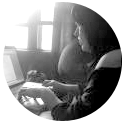Much Ado About Dialogue
 Subtitle: Why You Should Resist The Urge To Write Fo-Net-Ick-Lee
Subtitle: Why You Should Resist The Urge To Write Fo-Net-Ick-Lee
You thought I’d finished talking about dialogue, didn’t you? Mwah ha ha! There’s more. (There’s always more, when it’s dialogue-related. Don’t worry; it’s painless. No thesauri involved.)
Dialogue is one of the writer’s most powerful weapons. Powerful doesn’t mean easy, though; as with all weaponry, it can backfire. The skilful can use it to smite their enemies. The less-skilful, however, can end up shooting themselves in the foot.
I had considered breaking down the different types of dialogue until I remembered that good dialogue really only boils down to one thing: conveying information. Whether it’s about the situation, the plot or the character, the trick is to provide the details without smacking the reader in the face with them.
One of the best ways to do this is to avoid employing the classic “As you know, Jim” approach. As in:
“You look tired, Bob. Is everything OK?”
“I’m exhausted trying to look after all of the endangered lemurs that were entrusted to my care by my recently deceased aunt who, as you know, Jim, owned a zoo in the middle of the desert because she refused to live anywhere near the coastline for a mysterious and unexplained reason, which possibly could involve the fact that she was estranged from the rest of my family.”
At this point, believe me, Jim wishes he hadn’t asked Bob anything in the first place.
Try this exchange instead:
“Lemurs still keeping you up?”
“If I’d known how much work they were, I’d never have taken them on.”
“It’s not like you really had a choice. Who else was Hermoine going to leave her zoo to?”
“She had other nephews. Why me?”
“Because you hate the sea as much as she did? Because you were the only relative who visited when she was dying? I don’t know; you’re both weird.”
There you have it: information without the dreaded information dump. Add in tags and action as desired. Mix and stir.
Dialogue is also a very powerful way of saying something about a character.
Consider this scene: it’s midnight at a deserted crossroad. A car has crashed into a tree. There are no signs of life. A second car pulls up, and the driver winds his/her window down. What's the first thing they say?
- “Damned kids.”
- “Stephanie, whatever you do, don’t call the cops.”
- "That’s a heritage-listed oak, you know!”
- “Brilliant, I needed another cadaver. This’ll save me a trip.”
You don’t need to explain straight away who this person is; one line will immediately give the reader some idea.
In addition, the best dialogue both advances the plot and reveals something about the person saying it. If you can inject something of each aspect into every line your characters speak, you’re gold.
One note of caution: watch the slang, which can date a book faster than describing someone's puffball skirt*. Phrases you possibly used in your youth will now sound hilarious. (Either that, or your reader won’t know if your character is being deliberately ironic. “That sounds rad.”) If you haven’t read The Great Gatsby lately, do so—its dialogue anchors it to the 1920s, old sport. However, it’s Fitzgerald; it's a classic for a reason.
I’ve discussed previously how it’s important for dialogue to be something that you can imagine people actually saying. ‘Write the way people talk’ is a good starting point, but I don't recommend sticking to this rule all the time. Sit in a coffee shop or at a bus stop and listen to an average conversation. Would you want to have to read every syllable of that? All the 'uh's and 'um's? No. Don’t make your reader work through every verbal tic. They will start twitching.
My final note: accents. Use with caution. Try to give the impression of an accent through the rhythm of the words, the choice of language, and cadence. Please resist the urge to write phonetically, unless you can wield a glottal stop on the page as well as Irvine Welsh. (And, if you can, call me!)
* Every Millenial reading this: "Whuh?" Here you go. They were truly heinous.
Want more publishing insights, writing tips, or just general book-related gossip? Just click here to sign up for my e.newsletter!






